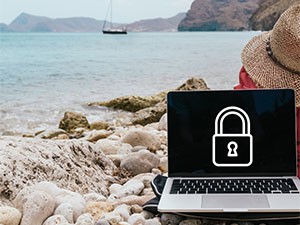Summer is a popular time for business owners and employees to step out of the office and take a well-deserved vacation. Even if their “out of office” e-mail responder is active, many people will periodically check in on work at least once while traveling. Unfortunately, studies show that working outside of the office – whether it’s a few simple check-ins on vacation, connecting to the Internet at a local coffee shop or even business travelers out on work trips – can lead to major cybersecurity issues. If you or your employees will be answering urgent e-mails from the airport or accessing network documents in the hotel lobby, it’s essential to maintain strong cybersecurity best practices to avoid exposing the company’s network to hackers preying nearby.
In this blog post, we’ll cover what cybersecurity best practices are necessary for you to take before and during any trip to keep your network secure from hackers.
Why Cybersecurity Matters While Traveling
Cybersecurity might not be at the top of your vacation checklist, but ignoring it can turn your dream getaway into a horrible nightmare. Cybercriminals know summer is a prime time to attack because people are more likely to let their guard down while on vacation. For most vacationers, the focus is on enjoying time out of the office instead of ensuring they’re following cybersecurity best practices, making them an easy target for hackers.
To minimize the risk of a cyberattack while traveling, here are a few best practices to cover with anyone on your team who might connect to the Internet while on vacation.
Before you go:
- Back up your data – If your device gets lost or ruined, you’ll want a copy of your data available to be restored.
- Update your software – Make sure your operating system software, web browsers and apps have all been updated to the latest version. Outdated software can impact your device’s ability to defend against malware.
- Protect your devices – You should always lock your device using a PIN, passcode, fingerprint or facial recognition feature, but if you don’t already, set this up before traveling. If you leave your device unattended and someone attempts to access it, they will have full access to your private information if it’s not locked.
- Enable “Find My Phone” – This feature will allow you to locate your device if you lose it, but it also gives you the power to remotely wipe data or disable the device if it falls into the wrong hands.
While traveling:
- Use a Virtual Private Network (VPN) – A VPN encrypts your Internet connection, ensuring your data is secure even when you use public WiFi networks. Before you leave, set up a VPN on your devices and use it whenever you access the Internet.
- Don’t connect to public WiFi – While public WiFi offers convenience, these networks can be a hotspot for cybercriminal activity. Avoid unprotected networks whenever possible. (Yes, that means no checking your e-mail on the beach unless you have a VPN!)
- Manage location services – Location tools are useful for navigating new places but can also expose your location to criminals. Turn off location services when you’re not actively using that feature, and consider limiting how you share your location on social media.
- Enable Multifactor Authentication (MFA) – MFA adds an extra layer of security to your accounts by requiring a second verification form, such as a text message code, authenticator code or fingerprint scan. This feature should be enabled for all accounts containing sensitive information before leaving your house.
- Disable auto-connect features – Some devices automatically seek and connect to available wireless networks. These features can give cybercriminals access to your devices if you connect to the wrong network. Disable this option so you only connect to wireless and Bluetooth networks you know and trust.
You should be able to relax on vacation. Taking these simple precautions can help you keep your device secure so you can enjoy your time off and don’t have to worry about dealing with cyber issues when you get back to work.
However, it’s important to know that these steps aren’t fail-proof. To truly ensure that your company’s cybersecurity measures are up to standard, it’s important to work with a professional IT team that can monitor your network 24/7, patch any vulnerabilities that pop up (which happens regularly) and alert you if something seems suspicious.

